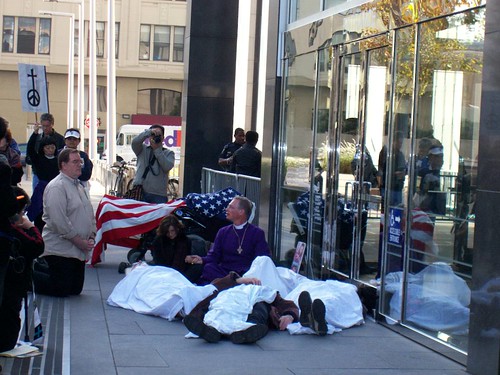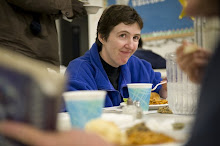Yes, you never hear from me anymore; you just read my homilies. This did not come together as well as the last one, but I think it's still worth posting. I preached it in class yesterday.
The process here was entirely different from the previous one. Before, we each had a different passage from Mark to preach on. Now, four or five of us each week are preaching on the following Sunday's lections. I could have had an easier time if I'd just chosen to preach on Mark. I wanted to do something more challenging, and different. I was not as connected with these texts; but that can hardly be helped, when I got my totem text on the very first try. I was looking for parallels, and I explored midrash (without knowing that name) looking for them. Someone said she wanted actual interaction between Job and the man in Mark; I like that idea, and it would be something to think about playing with later. This, like the last one, came together right before I had to give it.
I felt mildly heretical in a couple of ways; our instructor advises us to choose one lection, and we had a discussion before about how outside poems may or may not work. I used one anyway, and I probably would again, though I'd think about it more deeply.
I'm working very hard on vocal presence and delivery. I'm realizing how powerful and how important it is to bring what's inside of me out, through more ways than writing. I didn't feel as grounded in my body as I'd wanted to; part of that was nervousness in front of a video camera. Vocally, though, I'm getting it. That feels really good.
Job 23:1-9, 16-17
Mark 10:17-31
Have you ever wanted something you couldn’t have? Have you ever had everything you could have wanted, and lost it in an instant?
If God completely blew your mind about the whole idea of having or being enough, what would you do?
Today, we hear two answers to these questions. We meet a man, in the gospel of Mark, who cannot separate himself from his things. And we witness Job, who has lost everything in one stroke, and who cannot bear the thought of losing God.
We know the man as the “rich young ruler,” but that is a conflation of all three Gospel stories. Luke calls him a ruler; Matthew says he’s young. In this earlier account, he owns many things, but speaks of his youth in the past tense.
We meet him running after Jesus, on a journey we know not where. This story directly follows Jesus’ encounter with the children; perhaps the man had heard him tell the disciples to let the children come, and that the Kingdom of God belonged to them. Perhaps he heard them laugh; he saw a joy there that he distantly remembered. He’s grown now; he is weighted down with adult concerns. Perhaps he saw Jesus smile.
Whatever this man knows of Jesus and his movement, he sees something here that he wants. He chases Jesus and stops him on the road, asking how he can get that too. Jesus challenges him, first asking for the flattery to stop and then pushing him to think past the conventions that he already knows.
“Yes,” the man agrees, “I’ve followed the law from my youth.”
Jesus looks into him, with love.
“Yes, you have, but can you leave your wealth behind?”
“Can you sell off everything that establishes your identity in this world, and give to the ones who need it?”
One commentator reminds us that pious men were expected to prosper, as a sign that their religious observance granted them favor with God. These men then could be benefactors for others, giving at their discretion to people in need. The recipients would then of course be grateful, and the wealthy donors would have good reputations. In a class-bound society, their status would increase.
Jesus is saying, “Give all of that up. This is not about how the world sees you. The path to God is not about earthly privilege. This is about true freedom. This is about the capacity of your love.”
The man cannot do it. He can’t let go of his status, his wealth, his security. He sees in Jesus true assurance, true joy. He wants that, but he can’t let go enough to receive it. He goes away sad.
Jesus knows what he’s asked of the man, and he understands why it’s hard. Money talks. How you dress and what you own tells other people who you are. It tells them how to treat you. It tells you how to treat them.
God’s economy runs on completely different principles. God asks different questions.
How clear can your heart be?
How loving can you be?
Can you give up everything you hold on to, to follow me?
Do you know that I love you?
Do you know that the little, unencumbered, vulnerable, free child in you is enough?
I don’t think the man ever would have forgotten this conversation. He had looked in the eyes of pure love, and said no. But that experience would not have left him.
I wonder, as the preacher from Galilee became stories whispered over campfires, as the occupation tightened, as the man’s fortunes changed, did these words of Jesus roll around in his head? Did he fall asleep praying for understanding? Did he still see those eyes in his dreams at night?
As the siege began and the temple burned, and with it everything that a good, observant, faithful man never questioned, I wonder if Job would have had an answer for him.
Job is not an Israelite; he lives in another land and his name comes from the wider area. He is introduced in the first chapter as a man who has always striven after God, and always been astoundingly successful. He is “blameless, upright, one who feared God and turned away from evil.” He is scrupulously observant, and staggeringly wealthy. It is said that Job is the greatest of all the people of the east. At a time when material wealth was a clear sign of divine favor, Job is sitting happily in God’s lap, a shining example of all that is good.
Until the day Satan pokes God in the ribs. Satan happens by one day, out for a long walk hither and yon around the earth. God seizes the chance to brag on Job. Satan says, “well of course he’s faithful; he’s never been tested.”
“Oh,” says God. “Well, then, have at him.”
The next thing Job knows, four messengers have told him that his animals have been stolen or slaughtered, his servants killed by fire and violence, and a house has fallen on all of his children. His wealth has vanished, and his children are dead.
Job’s world has been destroyed in an instant.
Job responds with a natural grief. He tears his clothes, shaves his head…
and falls on the ground and worships.
God watches, knowing that he has allowed Job to be destroyed for no reason. Satan challenges God again, and Job loses his health. He continues to be faithful.
Today’s passage is in context of a long conversation. Three of Job’s friends had heard what happened to him. They came to comfort, console, and challenge him: how could such awful events happen to a righteous man?
What must Job have done to deserve this?
Job knows that he has done nothing. In answer to his friend’s accusation, Job protests. He still doesn’t know of the arrangement God has made with Satan. He doesn’t know why he is suffering. But he is sure that if he could find God, he could get God to listen. He would plead his case before God, and God would answer him. Job wants to understand.
But Job cannot find God, though he looks everywhere. And that, paired with the knowledge that God will do whatever God chooses, terrifies Job. He desperately seeks an audience with God. He also desperately wants to hide.
But he doesn’t.
Job grieves his lost connection with God. But he does not doubt that God still is there. When his life gets difficult, he doesn’t understand. He loses his rootedness. But he stays in the soil. He stays in the struggle. He stays in the conversation.
The man in Mark thought that giving up all of his things was impossible. He walked away defeated. Job has had everything taken from him. He is living in the impossible place. He screams and shouts and rails against it. But he stays present. All his life he has lived in communion with God. He wants that back. If he has to fight for it, he will.
A week ago yesterday, a man walked into an Amish one-room schoolhouse in Nickel Mines, PA. He sent the fifteen boys out of the building, along with four adults and their infant children. He shot all ten of the girls. Five of those girls died. The oldest was 13; the youngest was 7. Another girl, six years old, is not expected to survive.
The man also killed himself. He leaves a wife and three young children.
The man had lost a newborn daughter nine years ago. He was clearly disturbed for other reasons as well. He was angry at God, and confused, and distraught. He took out his rage on these children.
This man was buried yesterday. About 75 people came to his memorial. About half of them were Amish.
There’s a poem by the 13th century Sufi poet, Rumi, that helps me understand their compassion, their will to forgive, and their commitment to stay faithful to God. He writes,
Come, come, whoever you are,
Wanderer, worshiper, lover of leaving,
Ours is not a caravan of despair.
Come, come, whoever you are,
Even though you’ve broken your vows a thousand times,
Come, yet again,
Come.
We are about to celebrate the Eucharist. We are about to enter with our bodies into communion with God.
If you are happy and content with your life, come.
If you have a good and quiet conscience, come.
If something wonderful just happened, come.
If you are hiding a grief that consumes you, come.
If God is asking you to do something difficult, come.
If God is asking you to do something impossible, come.
If you’ve got four things due before Reading Week and you haven’t started any of them, come.
If you are angry with your mother or your child or your partner or your best friend, come.
If you are angry with God, come.
God calls all of us into struggle, into life, into conversation, into communion. All are welcome at the table of the Lord.






